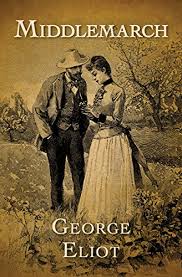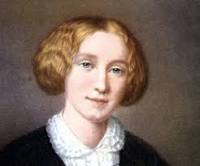Middlemarch Page #11
Middlemarch, A Study of Provincial Life is a novel by the English author George Eliot, appearing in eight instalments in 1871 and 1872. Set in a fictitious Midlands town from 1829 to 1832, it follows distinct, intersecting stories with many characters.
She was getting away from Tipton and Freshitt, and her own sad liability to tread in the wrong places on her way to the New Jerusalem. Mr. Brooke sat down in his arm-chair, stretched his legs towards the wood-fire, which had fallen into a wondrous mass of glowing dice between the dogs, and rubbed his hands gently, looking very mildly towards Dorothea, but with a neutral leisurely air, as if he had nothing particular to say. Dorothea closed her pamphlet, as soon as she was aware of her uncle’s presence, and rose as if to go. Usually she would have been interested about her uncle’s merciful errand on behalf of the criminal, but her late agitation had made her absent-minded. “I came back by Lowick, you know,” said Mr. Brooke, not as if with any intention to arrest her departure, but apparently from his usual tendency to say what he had said before. This fundamental principle of human speech was markedly exhibited in Mr. Brooke. “I lunched there and saw Casaubon’s library, and that kind of thing. There’s a sharp air, driving. Won’t you sit down, my dear? You look cold.” Dorothea felt quite inclined to accept the invitation. Some times, when her uncle’s easy way of taking things did not happen to be exasperating, it was rather soothing. She threw off her mantle and bonnet, and sat down opposite to him, enjoying the glow, but lifting up her beautiful hands for a screen. They were not thin hands, or small hands; but powerful, feminine, maternal hands. She seemed to be holding them up in propitiation for her passionate desire to know and to think, which in the unfriendly mediums of Tipton and Freshitt had issued in crying and red eyelids. She bethought herself now of the condemned criminal. “What news have you brought about the sheep-stealer, uncle?” “What, poor Bunch?—well, it seems we can’t get him off—he is to be hanged.” Dorothea’s brow took an expression of reprobation and pity. “Hanged, you know,” said Mr. Brooke, with a quiet nod. “Poor Romilly! he would have helped us. I knew Romilly. Casaubon didn’t know Romilly. He is a little buried in books, you know, Casaubon is.” “When a man has great studies and is writing a great work, he must of course give up seeing much of the world. How can he go about making acquaintances?” “That’s true. But a man mopes, you know. I have always been a bachelor too, but I have that sort of disposition that I never moped; it was my way to go about everywhere and take in everything. I never moped: but I can see that Casaubon does, you know. He wants a companion—a companion, you know.” “It would be a great honor to any one to be his companion,” said Dorothea, energetically. “You like him, eh?” said Mr. Brooke, without showing any surprise, or other emotion. “Well, now, I’ve known Casaubon ten years, ever since he came to Lowick. But I never got anything out of him—any ideas, you know. However, he is a tiptop man and may be a bishop—that kind of thing, you know, if Peel stays in. And he has a very high opinion of you, my dear.” Dorothea could not speak. “The fact is, he has a very high opinion indeed of you. And he speaks uncommonly well—does Casaubon. He has deferred to me, you not being of age. In short, I have promised to speak to you, though I told him I thought there was not much chance. I was bound to tell him that. I said, my niece is very young, and that kind of thing. But I didn’t think it necessary to go into everything. However, the long and the short of it is, that he has asked my permission to make you an offer of marriage—of marriage, you know,” said Mr. Brooke, with his explanatory nod. “I thought it better to tell you, my dear.” No one could have detected any anxiety in Mr. Brooke’s manner, but he did really wish to know something of his niece’s mind, that, if there were any need for advice, he might give it in time. What feeling he, as a magistrate who had taken in so many ideas, could make room for, was unmixedly kind. Since Dorothea did not speak immediately, he repeated, “I thought it better to tell you, my dear.” “Thank you, uncle,” said Dorothea, in a clear unwavering tone. “I am very grateful to Mr. Casaubon. If he makes me an offer, I shall accept him. I admire and honor him more than any man I ever saw.” Mr. Brooke paused a little, and then said in a lingering low tone, “Ah? … Well! He is a good match in some respects. But now, Chettam is a good match. And our land lies together. I shall never interfere against your wishes, my dear. People should have their own way in marriage, and that sort of thing—up to a certain point, you know. I have always said that, up to a certain point. I wish you to marry well; and I have good reason to believe that Chettam wishes to marry you. I mention it, you know.” “It is impossible that I should ever marry Sir James Chettam,” said Dorothea. “If he thinks of marrying me, he has made a great mistake.” “That is it, you see. One never knows. I should have thought Chettam was just the sort of man a woman would like, now.” “Pray do not mention him in that light again, uncle,” said Dorothea, feeling some of her late irritation revive. Mr. Brooke wondered, and felt that women were an inexhaustible subject of study, since even he at his age was not in a perfect state of scientific prediction about them. Here was a fellow like Chettam with no chance at all. “Well, but Casaubon, now. There is no hurry—I mean for you. It’s true, every year will tell upon him. He is over five-and-forty, you know. I should say a good seven-and-twenty years older than you. To be sure,—if you like learning and standing, and that sort of thing, we can’t have everything. And his income is good—he has a handsome property independent of the Church—his income is good. Still he is not young, and I must not conceal from you, my dear, that I think his health is not over-strong. I know nothing else against him.” “I should not wish to have a husband very near my own age,” said Dorothea, with grave decision. “I should wish to have a husband who was above me in judgment and in all knowledge.” Mr. Brooke repeated his subdued, “Ah?—I thought you had more of your own opinion than most girls. I thought you liked your own opinion—liked it, you know.” “I cannot imagine myself living without some opinions, but I should wish to have good reasons for them, and a wise man could help me to see which opinions had the best foundation, and would help me to live according to them.” “Very true. You couldn’t put the thing better—couldn’t put it better, beforehand, you know. But there are oddities in things,” continued Mr. Brooke, whose conscience was really roused to do the best he could for his niece on this occasion. “Life isn’t cast in a mould—not cut out by rule and line, and that sort of thing. I never married myself, and it will be the better for you and yours. The fact is, I never loved any one well enough to put myself into a noose for them. It is a noose, you know. Temper, now. There is temper. And a husband likes to be master.”
Translation
Translate and read this book in other languages:
Select another language:
- - Select -
- 简体中文 (Chinese - Simplified)
- 繁體中文 (Chinese - Traditional)
- Español (Spanish)
- Esperanto (Esperanto)
- 日本語 (Japanese)
- Português (Portuguese)
- Deutsch (German)
- العربية (Arabic)
- Français (French)
- Русский (Russian)
- ಕನ್ನಡ (Kannada)
- 한국어 (Korean)
- עברית (Hebrew)
- Gaeilge (Irish)
- Українська (Ukrainian)
- اردو (Urdu)
- Magyar (Hungarian)
- मानक हिन्दी (Hindi)
- Indonesia (Indonesian)
- Italiano (Italian)
- தமிழ் (Tamil)
- Türkçe (Turkish)
- తెలుగు (Telugu)
- ภาษาไทย (Thai)
- Tiếng Việt (Vietnamese)
- Čeština (Czech)
- Polski (Polish)
- Bahasa Indonesia (Indonesian)
- Românește (Romanian)
- Nederlands (Dutch)
- Ελληνικά (Greek)
- Latinum (Latin)
- Svenska (Swedish)
- Dansk (Danish)
- Suomi (Finnish)
- فارسی (Persian)
- ייִדיש (Yiddish)
- հայերեն (Armenian)
- Norsk (Norwegian)
- English (English)
Citation
Use the citation below to add this book to your bibliography:
Style:MLAChicagoAPA
"Middlemarch Books." Literature.com. STANDS4 LLC, 2024. Web. 24 Nov. 2024. <https://www.literature.com/book/middlemarch_242>.




Discuss this Middlemarch book with the community:
Report Comment
We're doing our best to make sure our content is useful, accurate and safe.
If by any chance you spot an inappropriate comment while navigating through our website please use this form to let us know, and we'll take care of it shortly.
Attachment
You need to be logged in to favorite.
Log In